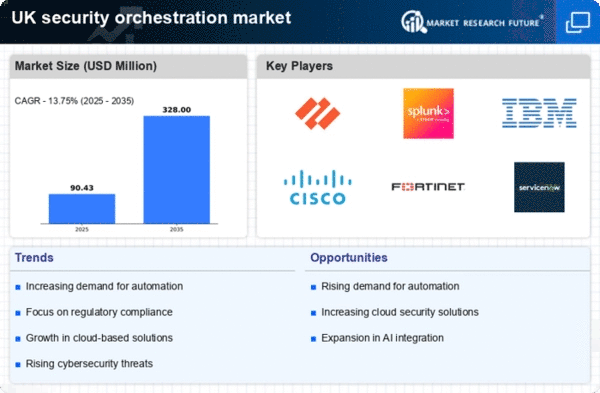Rising Cyber Threat Landscape
The security orchestration market is experiencing heightened demand due to the escalating cyber threat landscape in the UK. With cyberattacks becoming increasingly sophisticated, organisations are compelled to adopt advanced security measures. Reports indicate that cybercrime costs the UK economy approximately £27 billion annually, prompting businesses to invest in security orchestration solutions. These solutions enable organisations to automate incident response, thereby reducing the time taken to mitigate threats. As the frequency and complexity of attacks rise, the need for integrated security systems that can orchestrate responses across various platforms becomes paramount. This driver highlights the urgency for businesses to enhance their security postures, thereby fuelling growth in the security orchestration market.
Increased Regulatory Pressures
The security orchestration market is significantly influenced by the increasing regulatory pressures faced by organisations in the UK. Compliance with regulations such as the General Data Protection Regulation (GDPR) and the Network and Information Systems (NIS) Directive necessitates robust security measures. Non-compliance can result in hefty fines, reaching up to €20 million or 4% of annual global turnover, whichever is higher. Consequently, organisations are investing in security orchestration solutions to ensure they meet these regulatory requirements effectively. These solutions facilitate streamlined compliance processes by automating reporting and incident management, thus reducing the risk of non-compliance. As regulatory frameworks continue to evolve, the demand for security orchestration market solutions is likely to grow.
Demand for Enhanced Incident Response
The security orchestration market is driven by the growing demand for enhanced incident response capabilities among UK organizations. As cyber threats evolve, the ability to respond swiftly and effectively to incidents is crucial. Security orchestration solutions provide automated workflows that streamline incident response processes, allowing security teams to focus on strategic tasks rather than manual interventions. Research suggests that organisations employing security orchestration can reduce incident response times by up to 50%. This efficiency not only mitigates potential damages but also enhances overall security posture. The increasing recognition of the importance of rapid incident response is likely to propel further investment in the security orchestration market.
Integration of Diverse Security Tools
The security orchestration market is significantly impacted by the need for integration of diverse security tools within UK organisations. Many businesses utilise a variety of security solutions, which can lead to operational silos and inefficiencies. Security orchestration solutions facilitate the integration of these disparate tools, enabling a cohesive security strategy. This integration allows for improved visibility and control over security operations, which is essential in a landscape where threats can emerge from multiple vectors. The market for security orchestration is expected to grow as organizations recognize the value of a unified approach to security management. By breaking down silos, businesses can enhance their overall security effectiveness and responsiveness.
Shift Towards Cloud-Based Security Solutions
The security orchestration market is witnessing a notable shift towards cloud-based security solutions among UK organizations. As businesses increasingly migrate their operations to the cloud, the need for effective security orchestration becomes critical. Cloud environments present unique security challenges, necessitating solutions that can integrate seamlessly with existing infrastructure. The cloud security market is projected to reach $12 billion by 2025, indicating a robust growth trajectory. Security orchestration solutions that are cloud-native or compatible with cloud services enable organisations to manage security incidents more efficiently. This trend reflects a broader movement towards digital transformation, where organisations seek to enhance their security capabilities while maintaining operational agility.
















